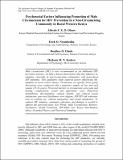Psychosocial factors influencing promotion of male circumcision for HIV prevention in a non-circumcising community in rural western Kenya

View/
Publication Date
2009-12-01Author
Alfredo FXO Obure, Erick O Nyambedha, Boniface O Oindo, Hezborn MN Kodero
Metadata
Show full item recordAbstract/
Male circumcision (MC) is now recommended as an additional HIV preventive measure, yet little is known about factors that may influence its adoption, especially in non-circumcising communities with generalized HIV pandemic. This qualitative study explored factors influencing MC adoption in rural western Kenya. Twenty-four sex specific focus group discussions were conducted with a purposive sample of Luo men and women (15-34 years). Perceived barriers to circumcision were pain and healing complications, actual and opportunity costs, behavioral disinhibition, discrimination, cultural identity, and reduced sexual satisfaction; perceived facilitators were hygiene, HIV/ STI risk reduction, ease in condom use, cultural integration, and sexual satisfaction. To enhance MC adoption, community education, and dialogue is needed to address the perceived fears.
